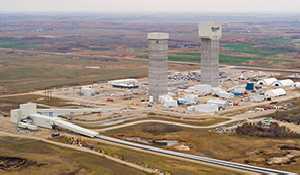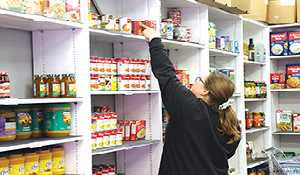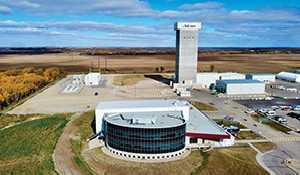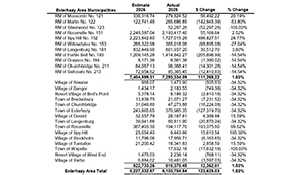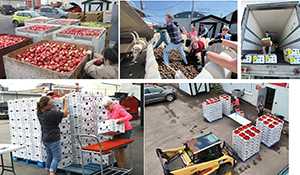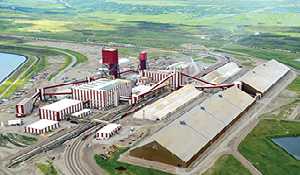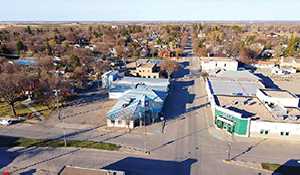Local farmer concerned about future fertilizer regulations
July 29, 2022, 10:50 am
Kevin Weedmark


Moosomin farmer Mark McCorriston is adding his voice to the farmers and industry groups saying that fertilizer curbs planned by the federal government will hurt agriculture, will hurt the Canadian economy, and will ultimately lead to less food being grown and people going hungry.
The federal government has set a target of reducing emissions from fertilizer by 30% below 2020 levels, by 2030.
“I’m not saying that everyone planet-wide shouldn’t try and do something about it, but we aren’t big enough globally to make a difference if it’s just us, Canada, and then the Netherlands is doing something about fertilizer. They’ve had lots of protesting. We won’t affect things on a global scale so it will just be taking money directly out of Canadian farmers’ pockets,” he says.
“The other thing is, Canada is a country that’s trying the help the world but we’re just going to starve third-world countries if we use less fertilizer and grow less food. Until world hunger is basically eliminated, we should probably just keep moving forward the way we are.”
McCorriston says fertilizer is crucial to modern farming.
“It’s crucial,” he said. “I’m not saying that there aren’t the odd organic farms that seem to make a living doing it, but at one time everybody organic-farmed and it wasn’t working so they came up with fertilizer and chemicals to get more bushels per acre.
“If you take fertilizer out of your scenario, it is still going to cost you the same amount of manpower, the same amount of wear and tear and the same amount of diesel fuel. You’ll just be putting less fertilizer down with the seeds and growing less bushels. So the cost will be there and you’ll just produce less.
“It’s a voluntary 30 per cent reduction at this time, so whatever you’re using, which varies—fertilizer is a very personal thing with farmers. Everybody has their own blend of fertilizer that they use. Some people use more and some people use less, but ultimately it’s your choice based on what you feel your land needs or what your soil testing shows you need.
“If you cut back fertilizer, the impact wouldn’t be as apparent right away, but after five years it would be apparent because slowly you would be taking the nutrients out of the land and not replacing them.”
McCorriston said this is not the time for the government to introduce curbs on fertilizer use.
“I just feel like we’ve made huge leaps and bounds. There’s new kinds of fertilizer, one being called ESN, which slowly releases nitrogen throughout the year as the plant needs it, then it becomes available so that you’re not maybe putting on too much at the beginning. With farmers carrying as much stress as they do, I just wish that we’d be kind of left out of things for a while.”
McCorriston said the federal government has not consulted with the agriculture industry on how curbing fertilizer use would impact the industry.
“I’m not even sure where it’s coming from,” he said. “The federal government announced this without even consulting any of the Saskatchewan or Western Canadian Ag leaders politically. The Saskatchewan Minister of Agriculture commented saying that they weren’t even consulted over this radical idea.
“Ultimately, Saskatchewan carries over 50 per cent of the brunt. It will affect Manitoba, not as much Alberta, but between those two provinces Saskatchewan has to carry the biggest cross. Over 10 years they’re predicting a loss just shy of $50 billion from the agriculture industry.”
He said a drop in Canadian food production would have global repercussions.
“Not only is it hurting farming, it’s hurting the global food market. And there are all those retailers that have established business and that’s their livelihood—selling fertilizer. It would be a huge impact to them as well. We’re kind of our own economy in agriculture. We work together, we buy fertilizer and they sell it. It would be a huge impact to them as well.”
He said there is no way to reduce fertilizer usage without impacting food production.
“Definitely the more fertilizer you use the more you grow. It’s maybe not instantaneous—you wouldn’t see it the first year, but say over three to five years of using more fertilizer, your yield is just slowly climbing. If you want to grow 50 bushels per acre of wheat, you’ll have to use so much nitrogen, so much phosphate, so much sulphur, and so much potash. Then it’s also a balance of if you use more nitrogen and phosphate, then you have to use more potash to help the crop stand up. Potash is the strength in the stem so if you’re using more than the other, you need to have the blend stay the same within reason. But some people have blacker dirt so their land has more natural fertilizer than other people.
“It varies area to area and it varies from farm to farm. Everybody in the area on average uses fertilizer and a fair amount of it.”
“If we have to cut back on fertilizer, we’ll just start to grow less grain, yet our costs will be the same. As a whole Western Canada will produce less grain on average with expenses being the same. Unless there’s going to be some kind of subsidy, it’ll just be more money out of our pockets. I just don’t feel that agriculture is wealthy enough as an industry to handle this hit.”
He said he hopes feedback from agriculture and the public will kill the fertilizer plan, as it killed a federal plan to label ground beef as hazardous to health.
“I’m hoping that it’s kind of like this meat labelling thing. It just gets quiet and goes away. I feel that by not speaking up there’s more of a chance that nothing might happen. People need to speak up. They have to lobby and have their voices heard.
Major impact
Fertilizer Canada, the group representing manufacturers, wholesale and retail distributors for nitrogen, phosphate, potash and sulphur, has warned “cutting fertilizer applications to meet the federal government fertilizer emissions targets could reduce farm income by $48 billion over the next eight years.”
That figure—$48.36 billion over the years 2023 to 2030—comes from the summary of a report the group commissioned from MNP.
The figure covers Canada’s production of three crops—spring wheat, canola and corn and is based on a target proposed for the European Union.
“If Canada adopted the EU model, the potential economic impact of reduced fertilizer use would be devastating to Canadian farmers,” Fertilizer Canada said.
“The EU model” refers to a target laid out in the “EU Green Deal,” proposing to reduce “nutrient losses” of nitrogen and phosphorus by at least 50 per cent by 2030.
According to a November 2020 report prepared for the European Parliament’s committee on agriculture and rural development, that target would “reduce the use of fertilizers by at least 20 per cent by 2030.”









